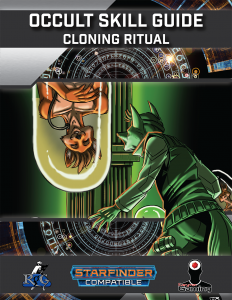Occult Skill Guide: Cloning Ritual (SFRPG)
Occult Skill Guide: Cloning Ritual (SFRPG)

This installment of the Occult Skill Guide-series clocks in at 17 pages, 1 page front cover, 1 page editorial, 2 pages of SRD, leaving us with 13 pages of content, so let’s take a look!
All right, after a brief introduction, we begin with the glossary for rituals – yes, this means that this is a full stand-alone supplement that doesn’t require the original rituals-supplements released in this series.
Rituals have three basic ritual components: The ceremony, which denotes the physical actions required to perform the ritual; the lore, which represents the history and information, and the seal – an occult sign that must be drawn to cast the ritual. Some rituals require a focus, and item that isn’t destroyed upon the ritual being cast. The characters engaging in a ritual are known as primary ritualist and secondary ritualist(s). Some rituals have additional requirements: Items consumed by the ritual are called “reagents”; traits the ritualists must shape/have are called “Characteristics”, and creatures offered as payment are called “Sacrifice” – this doesn’t mean that they are killed, though that may well be the case. Failure to perform a ritual properly can have dire consequences, and thus, this pdf does mention the appropriate failure consequences. Of course, success also has an effect.
A ritual has a key skill, and in order to learn a ritual, you have to have 3 the ritual’s level in skill ranks in the key skill, with the skill usually, but not always, being Computers, Engineering, Mysticism. The pdf also provides rules for learning rituals, and the pdf fully explains the process of performing a ritual in a step-by-step process that is easy to grasp. Since I already explained this in a previous review, I’ll just note that the book thus contains all the rules you require to make more rituals. The pdf even provides an explanation model of why rituals work that you can adopt or ignore – nice! (There is a minor formatting hiccup (a “1.”) in the Ceremony-section of the sample ritual, but that’s cosmetic only.)
All right, so that out of the way, let us check out the ritual, which would be clone creation. This is designated as a level 5 ritual, with the school necromancy and the descriptor [mageologic]. (Ritual descriptors also denote the key skills – mageologic rituals either use Life Science or Physical Science as key skill.). The ritual has a casting time of 5 hours, and requires a crystal formed of pure positive energy as a Focus. As far as reagents are concerned, an artificial uterus and a biochain variant android soul storage unit are required. Beyond that, raw elemental compounds, a sample genetic material and a proper laboratory would be required. Additionally, a mk 3 mnemonic editor is needed. The total cost sans focus of these reagents amount to 60,000 credits, excluding the editor. By the way: You REALLY don’t want to fail this ritual: At 4d3 temporary negative levels, 2d6 ability points damage to ALL scores and 13d20 acid damage, this will probably kill you off…
Anyway, let’s talk about the ceremony: The seal is drawn first, and corresponds to the clone to be created, which will either be a replica or a vessel; then, the growth chamber is assembled, whereafter the fertilization process commences. The clone reconstruction program is up next, and then the mnemonic editor is up next. Skill-wise, we have a lot of Life Science, with some steps requiring Computers and Mysticism checks, and DCs at 39 or 44.
Now, as for success criteria: Replicas are clones with a soul, including artificially memories that are based on telepathic bonds or analogue transfer processes, though the replica can develop independently. Vessels, on the other hand, are basically backup bodies, allowing for excellent means for the villains to return from the dead, for PCs to have an extra life or the like. And yes, the resurrection penalties are still retained. The costs of creating newborn clones and maturing them are covered, and the failure can result in the other clone type, as well as a chance for the primary ritualist to be memory wiped and spat out as an infant version of the clone sans memories or class features. This is a pretty cool way to kick off a campaign – or resume it after a TPK…just sayin’.
The pdf then proceeds to provide a rather cool legend, as well as 3 different sample encounter-suggestions for you to further jumpstart the creative processes.
Beyond that, the pdf also presents the massive “Do-it-yourself”-ritual creation engine that walks you, step by step, through the process of crafting your own rituals, which is a pretty amazing thing, and really easy to grasp, highlighting the author’s teaching experience.
Conclusion:
Editing and formatting are very good on a formal level, excellent on a rules-language level. Layout adheres to the series’ gorgeous two-column full-color standard, and the pdf contains a bunch of pretty awesome full-color artworks in Jacob Blackmon’s signature style. The pdf comes fully bookmarked for your convenience.
Alexander Augunas’ cloning ritual is an awesome offering: The supplement ultimately allows you to salvage a campaign from utter disaster and a TPK; it can allow you to change direction, Mass Effect 2-style. It can allow you to have your favorite villain return from the dead, or it can offer a great means to start a campaign, as the PCs try to reclaim their identities after a botched ritual, potentially trying to reclaim their (probably horrible!) memories! The pdf offers, thus, a ton of excellent fuel for creative GMs to take the game in new directions. Heck, you could play a Paranoia-style scenario, or provide a means to play a hyper-deadly meatgrinder. My final verdict will clock in at 5 stars + seal of approval. Highly recommended.
You can get this cool, evocative ritual and its mighty engine here on OBS!

Endzeitgeist out.
